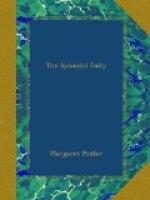At the time it had only given an additional twist to the threads of the intolerable web of mystery which had enmeshed her married life. But now it suddenly blazed out like a beacon illumining the dark places. Supposing it were true—supposing Max had been masquerading under another name all the time—then this suggestive little paragraph contained a clue from which she might perhaps unravel the whole hateful mystery.
Her brows drew together as she puzzled over the matter. This history of a morganatic marriage—it held a faint ring of familiarity. Vaguely she recollected having heard the story of some royal duke who had married an Englishwoman many years ago.
For a few minutes she racked her brain, unable to place the incident. Then, her eyes falling absently upon the newspaper once more, the last word of the paragraph suddenly unlocked the rusty door of memory.
Ruvania! She remembered the story now! There had once been a younger brother and heir of a reigning grand-duke of Ruvania who had fallen so headlong in love with a beautiful Englishwoman that he had renounced his royal state and his claims to the grand ducal throne, and had married the lady of his choice, thereafter living the life of a simple country gentleman.
The affair had taken place a good many years prior to Diana’s entry into life, but at the time it had made such a romantic appeal to the sentimental heart of the world at large that it had never been quite forgotten, and had been retold in Diana’s hearing on more than one occasion.
Indeed, she recollected having once seen a newspaper containing an early portrait of a family group composed of Duke Boris and his morganatic wife and children. There had been two of the latter, a boy and a girl, and Diana suddenly realised, with an irrepressible little flutter of tender excitement, that if the fantastic story hinted at in Tattle of the Town, were true, then the boy whom, years ago, she had seen pictured in the photograph must have been actually Max himself.
And—again if it were true—how naturally and easily it explained that little unconscious air of hauteur and authority that she had so often observed in him—the “lordly” air upon which she had laughingly remarked to Pobs, when describing the man who had been her companion on that memorable railway journey, when death had drawn very near them both and then had passed them by.
Her thoughts raced onward, envisaging the possibilities involved.
There were no dukes of Ruvania now; that she knew. The little State, close on the borders of Russia, had been—like so many of the smaller Eastern States—convulsed by a revolution, some ten years ago, and since then had been governed by a republic.
Was the explanation of all that had so mystified her to be found in the fact that Max was a political exile?
The Tattle of the Town paragraph practically suggested, that the affairs of the “well-known dramatist” were in some way bound up with the destiny of Ruvania. That was indicated plainly enough in the reference to “forthcoming events.”




